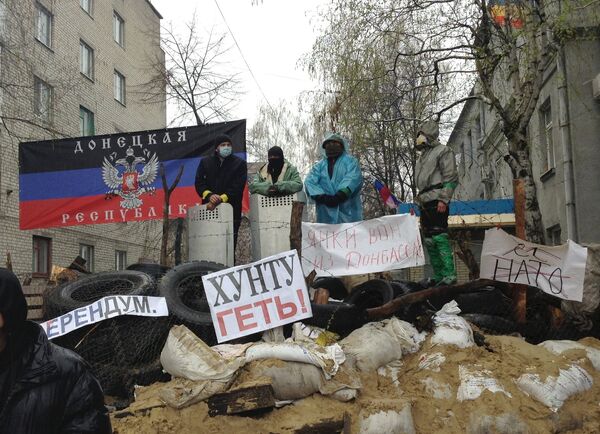MOSCOW, April 14 (RIA Novosti), Daria Chernyshova – Civil war in Ukraine is unlikely as Kiev’s junta is quickly losing support, according to Jon Hellevig, co-author of the book “Putin’s New Russia."
“I don't think there will be any civil war,” Hellevig, a managing partner at the Moscow-based Awara Group, told RIA Novosti.
“The Russian people of eastern and southern parts of present-day Ukraine will take over their local governments soon, without large-scale conflict,” said Hellevig, a longtime observer of Russia's development.
Pro-federalization protesters in Ukraine’s eastern city of Slaviansk ignored a Monday deadline by the central regime to lay down arms. On Sunday, Ukrainian security troops launched a so-called “anti-terror operation” to end the federalist rallies.
Demonstrations in support of the formation of a Ukrainian federation have been flaring up across the region since last month. On Saturday, the unrest spilled over to several other cities, including Mariupol, Yenakiyevo and Kramatorsk.
“I think that events in eastern parts of Ukraine are unfolding very fast and positively now,” Hellevig said. “We have seen that there is genuine disgust among the population towards the junta and the people have also organized armed self-defense units. The events of yesterday show that the junta does not have armed power to put down the resistance."
The botched attempt to storm Slaviansk on Sunday is further proof of the central authorities' lack of support, as was the disobedience of the Alpha special forces unit that was ordered to storm occupied buildings in Donetsk, Hellevig said.
“Reports on the ground today support the notion that the operation is not going well,” Hellevig said, commenting on the use of military force by Ukraine’s acting President Turchinov to quell the protests.
“The junta is desperate. They are losing support fast. In this situation, they tried to save themselves by trying to make themselves stronger than they really are,” Hellevig said.
Anatoly Karlin, who runs the blog Da Russophile, however, said that if Kiev tries to wipe out the “terrorists,” which is one possible scenario, it will “totally alienate eastern populations that are already very unhappy,” Karlin told RIA Novosti.
“Given the mass defections to the separatist cause amongst the eastern siloviki, and the fact that Kiev can only truly rely upon Western Ukrainian units, the chances of success are low. If it were to pursue this route, it may well truly get a civil war on its hands,” Karlin said.
Another scenario, according to Karlin, would be Kiev agreeing to expanded regional autonomy for the country. “Any help or coordination that Russia provides to the separatist militias in Donbas and other cities in the east isn’t a prelude to unification, as in Crimea, but is meant to exert pressure on Kiev to agree to wide-ranging federalization,” Karlin told RIA Novosti.
“Ukraine was ‘lost’ to the Eurasian Union when the Maidan overthrew Yanukovych in their coup. The plan now is to win at least half of it back,” he said.
Assessing the recent protests in the country, Hellevig said there is an option of federalization of Ukraine with increased autonomy for eastern and southern regions.
“I think, and indeed, hope for another solution, which would entail that these Russian-populated regions would form their own federal country independent from Western Ukrainians. This new federal country (Lugansk, Kharkov, Donetsk, Kherson, Dnepropetrovks, Zaparozhye and Odessa) could then become a member of the Union State of Belarus and Russia,” Hellevig told RIA Novosti.
The operation in Slaviansk came in defiance of warnings by Moscow and international experts that a violent crackdown on the demonstrators – who are seeking increased local autonomy – risked escalating the crisis and plunging the country into civil war.


